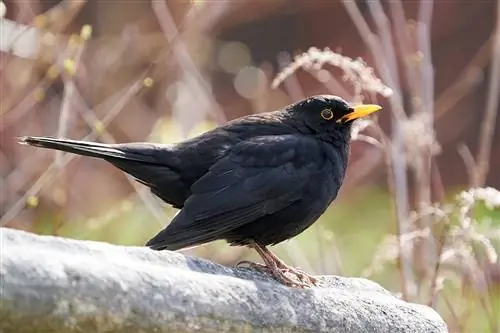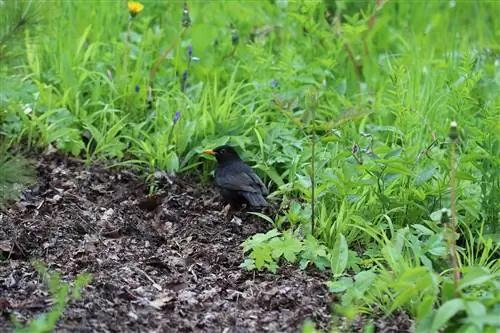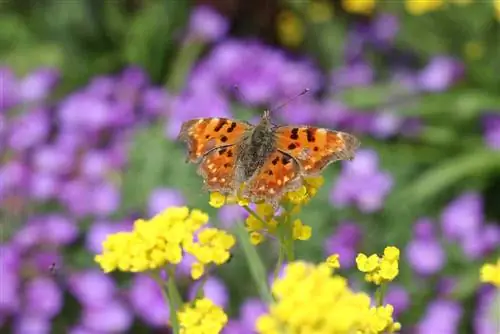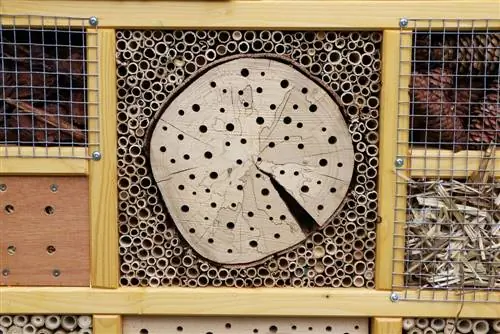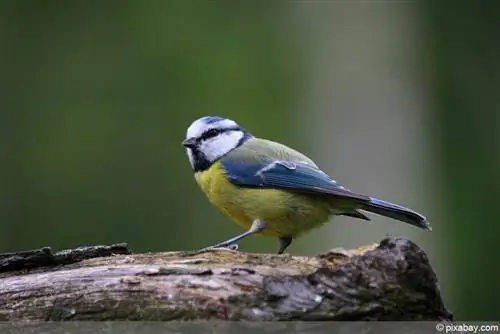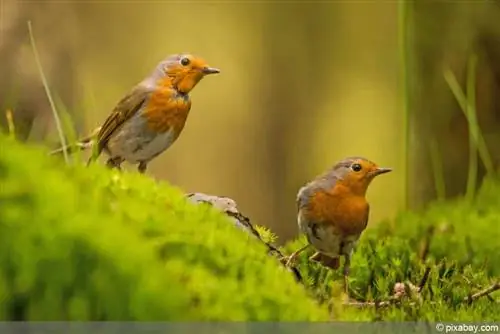- Author admin caroline@plants-knowledge.com.
- Public 2023-12-17 03:39.
- Last modified 2025-01-24 12:45.
Blackbirds (Turdus merula) are not threatened with extinction, but not only bird lovers should be informed about their breeding season and details in order to recognize them and be able to behave correctly.
breeding season
The breeding season of blackbirds usually extends from February to July. Depending on weather conditions and the environment, it can take place as early as February and, under certain circumstances, can be delayed until August. In milder regions, blackbirds often start breeding earlier. But that doesn't mean that their breeding season will end just as early.
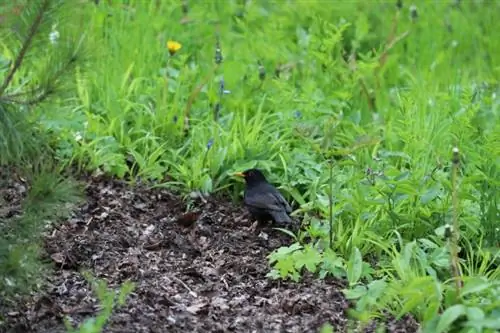
Breeding period
The breeding period is around 14 days. While the female warms her eggs, the male takes over territory defense. It sings noticeably loudly and frequently. This is to warn other males not to come too close to the breeding female. Breeding ends when the young hatch.
How often do blackbirds breed?
As a rule, blackbirds only breed once or twice a year. They can breed up to a maximum of five times. However, this usually only happens if one or more previous broods were not successful. The number of broods also depends on the region and surroundings. In areas where there is a high potential for disruption and danger to them and their brood, blackbirds usually nest less.
Nest building
So that the nest is ready for the offspring in time for the upcoming brood, blackbirds begin building the nest as soon as a partner has been found. This can be as early as late autumn, but this time is usually in early spring. The prerequisite is that there is sufficient soil moisture so that they can use wet soil to attach the nesting material.
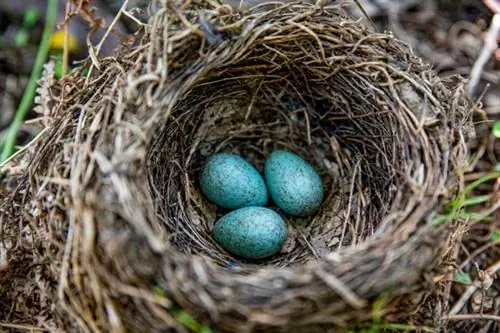
The following information is also worth knowing:
- Materials used: Leaves, flowers, grasses, small twigs, feathers
- Feathers and grasses used for interior nest design
- Preferred nesting locations: in trees, bushes, hedges, climbing plants; less common in plant pots and balcony boxes
- Nest building duration: depending on material availability two to three days
- Nest builder: Building males and females
- After building a nest, blackbirds can no longer be seen for one to three days
- Return to lay eggs
Tip:
Especially in urban areas, you can help the blackbirds build their nests in two ways: if you notice a pair, stay quiet, avoid noise and keep your distance. In addition, you can provide them with the necessary nesting materials and moist soil that should be easily accessible to them.
Hatched offspring
From the moment they hatch, the young must be fed and protected. Females and males go looking for food. They usually arrange their foraging so that one parent always stays near the nest. During the breeding season, a slightly more aggressive behavior of blackbirds can be observed if they perceive potential threats in the area.
Feeding the young
Females and males do the feeding equally. When breeding early in the year, sudden and/or prolonged ground frost can become a problem if the blackbird parents have little or no access to food. You can also scatter food around the nest, especially in the winter months or during the breeding season.
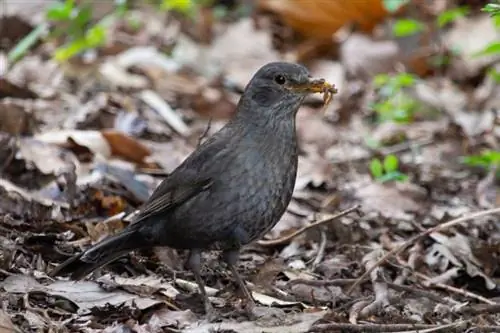
The preferred food for the young includes the following:
- smaller, softer insects
- small or fragmented worms
- small berries or berry pieces
Note:
If blackbird parents cannot access food due to frost in the ground and many insects have not yet woken up from their hibernation or come out of their winter hiding place, you should provide feeding assistance with the food mentioned above. But beware! Do not go too close to the nest and under no circumstances feed the young by hand, but simply leave the food clearly visible in the nearby area.
Nestlings fledge
After female and male blackbirds have fed and cared for their young for around 14 days, their plumage and ability to fly have developed to the point where they can now look after themselves. They fledge and leave the nest. Sometimes a young bird lands hard on the ground, but after a few flight exercises they fly away quite safely.
Blackbirds after rearing
After breeding is before breeding. Due to the short breeding period, blackbirds can breed several times a year. Once their offspring have fledged, the blackbird parents say goodbye to their young and “fly” their own ways again. Males and females also separate to look for new partners for the remaining breeding season and to hatch eggs again.
Frequently asked questions
Does the blackbird use the nest several times to breed?
Blackbirds usually build a new nest for each brood. That assumes they can find the materials to do it. If this is not possible or only possible under difficult conditions, the blackbirds occasionally use nests that have already been built. They only improve these if necessary. This can often be observed, especially in urban areas, where suitable materials are rare or are thrown away by people.
How long does it take from the time the eggs are laid until the young fledge?
In total, it takes around 26 to 32 days from the time they lay their eggs until they leave the nest and go their own way. If the feeding conditions are poor, the duration can be postponed by a few days.
At what age do blackbirds breed?
Blackbirds are already sexually mature in their second year of life. This means that this year's nestlings will breed for the first time next year. Normally, wild blackbirds breed over the following four to five years, which corresponds to their average life expectancy. Blackbirds kept in cages can live up to 20 years under optimal conditions and can breed for just as long.
What to do with “orphaned” blackbird nestlings that have fallen out of the nest?
In any case, action should only be taken in absolute emergencies. Orphaned nestlings are often “adopted” by other blackbirds when they hear desperate, incessant begging calls from them. If this is not the case, you can move the young animals to a safe place or, better yet, inform a recognized bird rescue center or bird care station. If they fall out, you should watch them for 3 to 4 hours and be sure that the parents do not come back. Only then should you act as described above.

